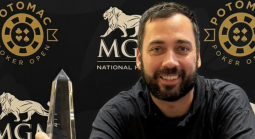Internet Gambling, Horse Racing Regulated Simulcasting on Agenda in Massachusetts

By STEVE LeBLANC, The Associated Press
BOSTON — The Massachusetts Gaming Commission is pressing lawmakers and Gov. Deval Patrick to push back a key deadline for the panel to take over the regulation of horse racing and simulcasting, saying the expanded duties will make it harder to get new casinos up and running.
Commission chairman Steven Crosby said Tuesday that the panel will meet the May 20 takeover deadline if needed, but said delaying the change makes more sense for the state.
Under the casino law approved by lawmakers and signed by Gov. Deval Patrick, the new five-member gambling commission is supposed to oversee virtually all gambling in the state, except for the lottery.
But Crosby said adding the responsibilities of the state racing commission to the gambling panel’s to-do list now will only create another hurdle to the gambling commission’s principal task of licensing three up to three casinos and a single slots parlor.
“We don’t think postponing this hurts anyone,” Crosby said.
A spokesman for House Speaker Robert DeLeo, D-Winthrop, declined to comment on the request, which would likely require new legislation.
Crosby said the gambling commission is also working to better respond to city and town leaders who are already asking questions about potential casinos in their communities.
Crosby said in some cases smaller towns are overwhelmed and may need organizational and financial support to help assess the prospect of a casino.
“They are really at sea at how to handle this stuff,” Crosby said. “This area is going to get bigger and bigger and more complicated.”
Crosby said the challenge is how to get information and help to communities without creating the perception of favoritism, since it will ultimately be up to the commission to award the coveted licenses.
Commission members also said they’re also hoping to get better information on potential jobs numbers and revenue from casinos. Crosby noted the law allows the commission wide latitude to authorize “up to” three casinos.
After the meeting, Crosby told reporters he wants to know if it makes more sense to license all the casinos at once or stagger them. He also said he wants to know if locating two casinos relatively close to each other will make a difference in potential revenue for the state.
The panel is also keeping an eye on two other issues — the question of what to do if Internet gambling is legalized, and how to handle the question of tribal gambling given an ongoing lawsuit.
A federal judge in February threw out the lawsuit that alleged the casino law is unconstitutional because it gives an advantage to federally recognized Indian tribes.
Lawyers for KG Urban Enterprises, which wants to build a casino in southeastern Massachusetts, said they planned to appeal the decision to the 1st U.S. Circuit Court of Appeals in Boston.
Commission member James McHugh, a retired state appeals court justice, said it could take until the end of the year for the appeals court to rule.
If the court decides that part of the state law unconstitutional, it could upend the process of granting a license to a casino in the southeastern part of the state, McHugh said.
The commission also announced that it will hold what it’(s calling a “daylong educational forum for the Massachusetts Gaming Commissioners and the public on best practices in gaming administration, regulation, and enforcement.”
The commission said the forum — scheduled for May 3 at the Boston Convention and Exhibition Center — will include presentations and panel participation by industry leaders who have experience regulating gambling in other states.













